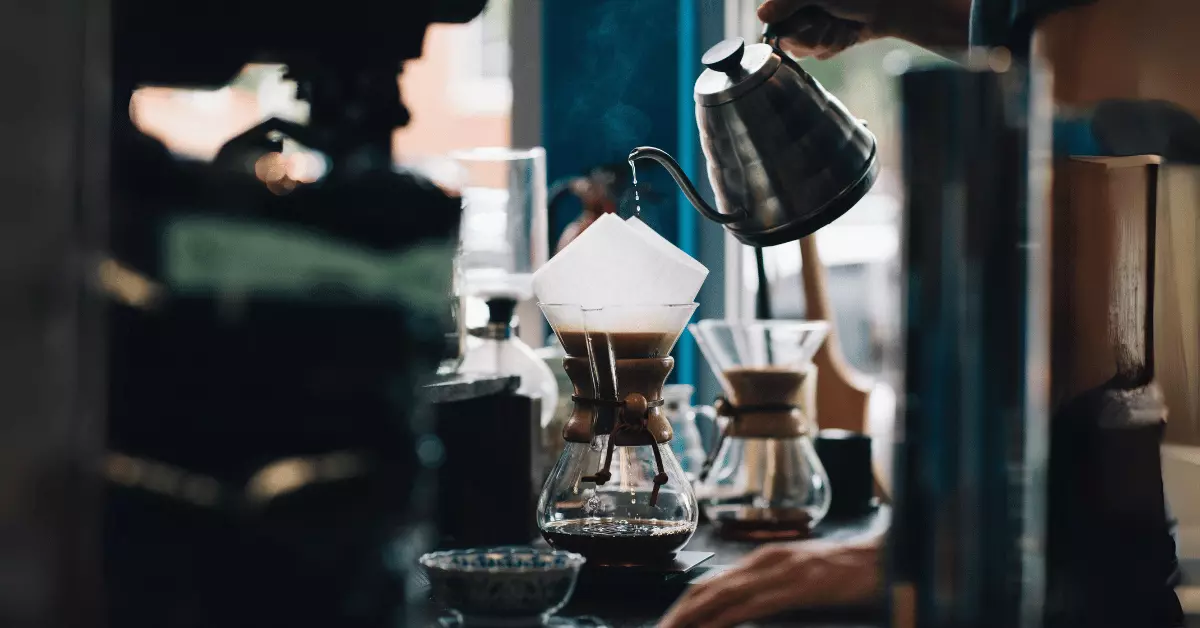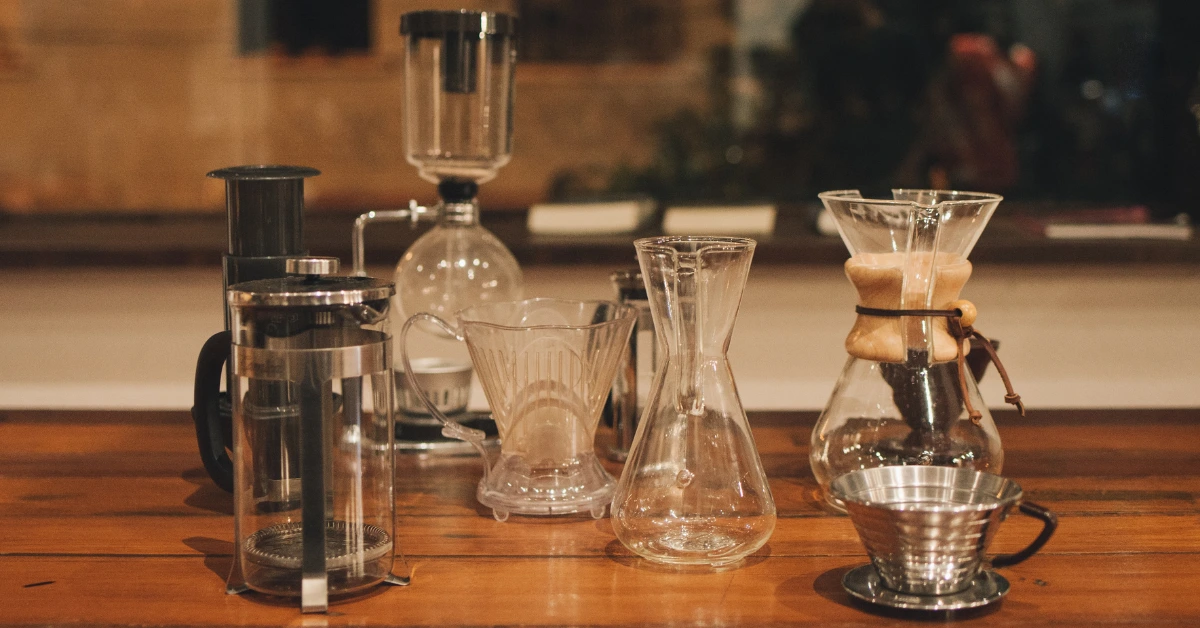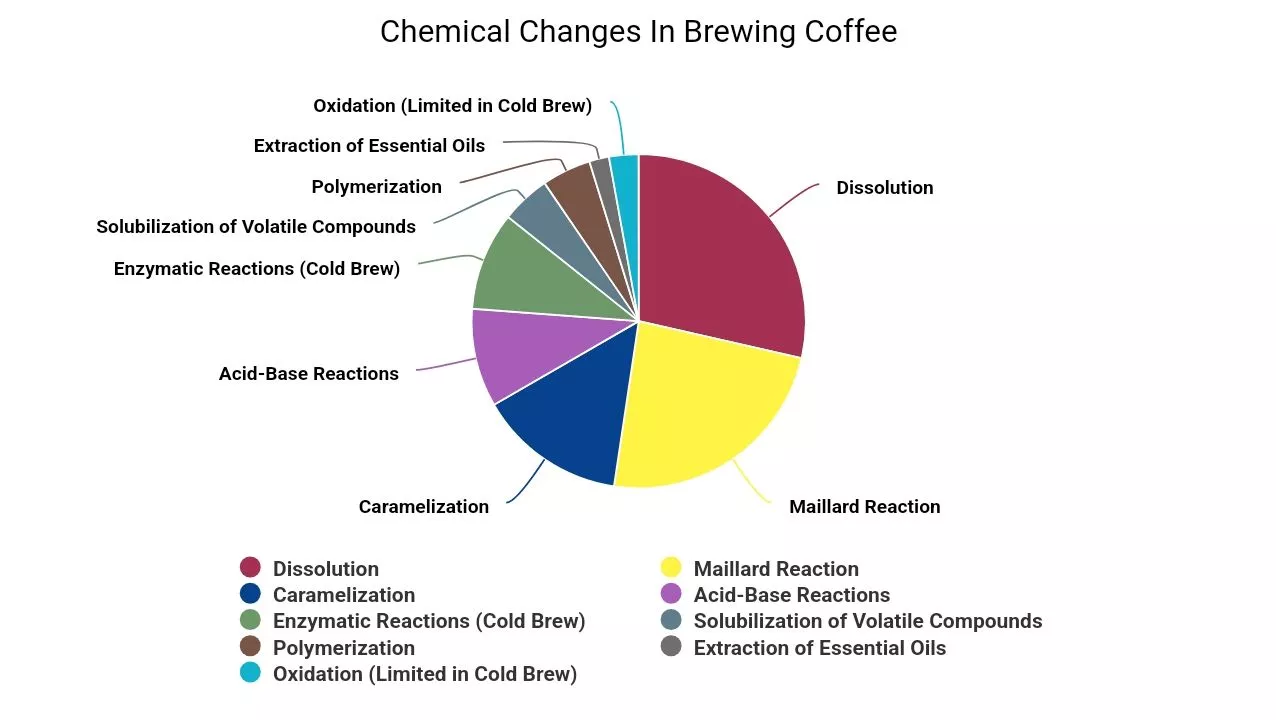
Actually, brewing coffee involves both physical and chemical changes. From coffee beans to a cup of coffee, it requires both types of changes. Normally in grinding, wetting, filtering etc., physical changes take place. On the other hand, chemical changes take place in the extraction phase. With both types of changes, you can get a yummy cup of coffee.
Coffee brewing is an interesting and experimental way of enjoying a beverage. Any type of coffee you brew, the coffee beans go through many changes to turn into a tasty cup of coffee. What do you think; is brewing coffee a chemical change? Let’s find out what kind of change brewing coffee is.
In this article, first of all, we have clarified what the physical and chemical changes are. Then there is a detailed description of the physical and chemical changes of brewing coffee. For your better understanding, we have distinguished the changes for both hot and cold brewed coffee. We have also presented a chart showing the percentages of the chemical changes in the coffee brewing process. At last, we have discussed the impacts (both positive and negative) of physical and chemical changes on our health. Check out the article to know these in detail.
Introducing Physical And Chemical Changes
Is brewing coffee a chemical or physical change? To find it out, you have to know what physical and chemical changes are.
Physical change is actually a transformation from one physical state to another. It does not change the main nature of the substance. On the other hand, in chemical change, the things or substances transform into another thing or substance. The nature and chemical bonds change in it.
Let’s have a look at the following table showing differences in physical and chemical changes.
| Aspects | Physical Changes | Chemical Changes |
| Nature of Change | Transformation in the physical state or appearance. | Transformation into another thing or substance. |
| Key characteristics | No new substances are formed. | Formation of new substances. |
| Reversibility | Often reversible. | Often irreversible. |
| Energy Change | Minimal energy change. | Significant energy change. |
| Example | Grinding, wetting, filtering etc. | Extracting. |
Physical Changes In Brewing Coffee

As we have mentioned, brewing coffee goes through both physical and chemical changes. So, what are the physical changes of brewing coffee? Let’s talk about the physical changes of different stages of brewing coffee (both hot and cold coffee).
Grinding
As you know, to make coffee first of all you have to grind your chosen coffee beans. What happens when you grind the beans? The beans break down into pieces and then into smaller to smallest particles. So, it only changes the physical appearance of the beans, nothing else.
Wetting
When you put water; hot or cold, into your coffee grounds, the coffee grounds get wet. It starts to absorb water. This wetting process is a physical change. After wetting the chemical changes take place. We will discuss the chemical changes in the later part.
Filtering or Pressing

When you are done with extraction, you have to filter your coffee. In some methods, you might need to press the handle kind of thing to separate your coffee extracts and coffee grounds. To know the detailed process you can check our website “Coffee Mart Blog”. So, this stage only separates the coffee extracts. Here no chemical changes take place.
Dilution
In the case of cold brew coffee or any coffee, you can dilute it. Dilution means adding water, milk or ice to adjust the strength of your coffee. In this way, you can turn your strong coffee into a mild one. This is also a physical change.
Chemical Changes In Brewing Coffee
Is brewing coffee a chemical change? Well, brewing coffee is partially considered a chemical change. Actually, it is the combination of both physical and chemical changes. We have already discussed the physical changes. Now, let’s move into the tough part; the chemical changes. Mostly the chemical changes take place in the extraction step. Here we are presenting all the chemical changes for your better understanding.
Extraction of Compounds
When you put hot water into the coffee grounds, the extraction process starts. It takes out some solids which can dissolve or melt in the water. Also, some acids, sugars and oils are extracted too. So, this change is a chemical change as the water and the coffee grounds change in this process.
Maillard Reaction
This reaction is a complex reaction. It is named after Maillard, who discovered it. This reaction takes place between amino acids (which come from proteins) and reducing sugars. This reaction makes your coffee look brownish. It also creates different flavors.
Caramelization
We know what caramelization is. In brewing coffee, the sugars melt at high temperatures. Then it starts to get brown which brings sweetness to your coffee.
Degassing
Degassing normally means releasing some gasses. When you roast the coffee beans, it releases carbon dioxide gas. At the time of brewing again some of this gas gets out. This can make your coffee flavorful and aromatic.
Acid-Based Reactions
There are some acids in coffee like Chlorogenic Acids. These can react with water. Ultimately, the overall acidity of your coffee comes out in a balanced way. So, this reaction is also a chemical change.
Solubilization or Dissolution
There are many compounds in coffee. These compounds come out into the water in the extraction phase. Then solubilization takes place. It means all the compounds dissolve or melt into the water. It can help to make your coffee fragrant and inviting.
Oxidation
Oxidation is a chemical reaction. Do you know what it is? When left in open air, some compounds react with the oxygen in the air. This is called the oxidation process. If you leave your brewed coffee at room temperature, the oxidation process can ruin the taste.
Distinguishing The Physical And Chemical Changes In Hot Coffee.
Now you know, “Is brewing coffee a chemical change?”. As there exists both physical and chemical changes, let’s distinguish the changes in hot coffee.
| Stages of Brewing | Physical Changes | Chemical Changes |
| Grinding | Physical transformation,
Break down the beans into smaller particles. |
No chemical changes. |
| Wetting | Swelling of particles. | Initiation of chemical changes. |
| Extraction | Changes are not physical. | Different Chemical changes:
|
| Filtering or Pressing | Physical change,
Separation of coffee extracts. |
No chemical changes. |
| Cooling | Physical change,
Temperature goes down. |
No chemical changes. |
| Leaving at room temperature for long periods | No physical changes. | A chemical change takes place:
Oxidation. |
Distinguishing The Physical And Chemical Changes In Cold Brew Coffee
Let’s discuss the phases of coffee brewing and changes in cold brew coffee. Some phases and changes are similar to hot coffee.
| Stages of Brewing | Physical Changes | Chemical Changes |
| Coarse Grinding | Physical transformation,
Break down the beans into smaller particles, Similar to breadcrumbs. |
No chemical changes. |
| Steeping or Soaking in Coldwater | Swelling of coffee grounds. | Different Chemical changes:
|
| Filtering or Pressing | Physical change,
Separation of coffee extracts. |
No chemical changes. |
| Dilution or Ice Addition | Physical change,
Coffee turns milder. |
No chemical changes. |
| Leaving at room temperature for long periods | No physical changes. | A chemical change takes place:
|
Percentages Of Different Chemical Changes In Brewing Coffee
We have already discussed many changes that happen during brewing coffee. Is brewing coffee a chemical change? Yes, it is partially a chemical change. Along with physical changes, coffee goes through many chemical changes. Here is our presentation of the approximate percentages of different chemical changes.
| Chemical Changes In Brewing Coffee | Approximate Percentages |
| Dissolution | 30% |
| Maillard Reaction | 25% |
| Enzymatic Reactions (Cold Brew) | 10% |
| Acid-Base Reactions | 10% |
| Caramelization | 15% |
| Solubilization of Volatile Compounds | 5% |
| Extraction of Essential Oils | 2% |
| Polymerization | 5% |
| Oxidation (Limited in Cold Brew) | 3% |
Here is a pie chart of the percentages. It may help to understand it easily.

Are The Chemical Changes Good Or Bad For Health? (Impacts On Health)
It is quite common to think chemical changes are dangerous or bad for us. It sometimes terrifies us to hear about chemical changes in coffee. While asking “Is brewing coffee a chemical change?”, many of us will be concerned about our health. Are these changes good or bad? Actually, you can consider the changes as good. These changes do not initiate any additional harm to your health. But it can be bad if you have any sensitivity or diseases.
Positive Aspects
-
- The chemical chagens in coffee make it rich in antioxidants. Antioxidants are one kind of substance which protects our cells from damage. So, the impact of chemical changes can be helpful in this way.
- Some acids are extracted from coffee with chemical changes. These can provide potential health benefits.
- The chemical changes also include caffeine extraction. This caffeine can improve the alertness. You will feel refreshed and awake by drinking coffee.
- Coffee consumption can reduce the risk of many diseases. So, it is quite beneficial for our health. You can reduce the risk of liver diseases too by consuming this beverage.
Negative Aspects
-
- Having too much coffee can lead to acidity. You may feel discomfort in the stomach. Those who have sensitive stomachs may experience Gastrointestinal diseases.
- Some of us may be sensitive to caffeine. It may affect our sleep cycle which will turn into insomnia later on. Increased heart rate or frequent nervousness can also be seen in such cases.
- Coffee consumption can affect our dental health. You might experience stained teeth and pain in your roots. It is a great concern nowadays.
- Those who have high blood pressure or other diseases are also at risk. Coffee will have a negative impact on their health. A woman who are in their pregnancy phase also should be concerned and minimize coffee intake.
Conclusion
If anyone asks “Is brewing coffee a chemical change?”, it will not make you tense anymore. The reason is, that now we have learnt brewing coffee involves both physical and chemical changes. These chemical changes are normally not harmful to our bodies. If you are going through any difficulties or diseases, then it is a different issue. So, it will be wise to consume coffee in moderation.
So, the chemical changes in coffee are normal. Moreover, it helps to bring out rich flavors and fragrances. If you want to explore different coffee recipes and have any confusion regarding coffee, you are always welcome to visit our website “Coffee Mart Blog”.
Frequently Asked Questions (FAQS)
Is grinding coffee beans a physical change?
Yes, grinding coffee beans is a physical change. While grinding, the beans break down into pieces and then into smaller to smallest particles. So, it only changes the physical appearance of the beans.
Is brewing coffee a chemical or physical change?
Brewing coffee involves actually both chemical and physical changes. We can not make a cup of coffee without any of the both changes. Normally in grinding, wetting, filtering etc., physical changes take place. On the other hand, chemical changes take place in the extraction phase.
What are the chemical changes involved in coffee brewing?
Along with physical changes, coffee goes through many chemical changes. Different Chemical changes in coffee brewing are:
- Dissolution
- Maillard Reaction
- Degassing
- Caramelization
- Acid-Based Reactions
- Polymerization
- Extraction of Essential Oils
- Enzymatic Reactions etc.
- If I keep my coffee at room temperature, what type of change will occur?
Keeping or storing brewed coffee at room temperature for a long period can affect the taste of your coffee. There will occur some chemical changes in the presence of air. This chemical change is called oxidation. It may ruin the taste of your coffee.

I am Mojoon, a certified and award-winning barista by choice, with 7 years of experience in the field. I have served and trained coffee shop baristas worldwide. I worked at Krispy Kreme for an extended period, and now I aim to help regular people brew coffee like me. I pursue this job with my passion for writing and also provide one-on-one coaching for newly minted baristas.